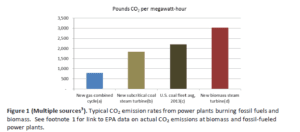Dangerous “Biomass Neutrality” Proposal in Senate Energy Bill.
The Energy Policy Modernization Act of 2015, which has passed the Senate and House, seeks to update the US power grid and the transportation systems for oil and gas. However, it was recently amended to include a clause that seeks to promote the use of timber for biomass energy production as a carbon neutral source of renewable energy. With the proposal tacked onto a bill that passed both the House and Senate with a large majority, it has a very good chance of passing.

The idea that burning timber for energy production is a sustainable method of energy production is derived from the fact that more trees can simply be planted to replace the ones that are cut down. Unfortunately, the amount of carbon created through combustion is very unsustainable and significantly higher than even coal! (Booth 2016) Biomass combustion creates high levels pollution in the form of smog and particulates. With the ever-rising carbon levels in our atmosphere, legislation promoting biomass as a carbon neutral source is energy is very troubling.
Two senators from Maine, Susan Collins and Angus King introduced the “biomass neutrality” proposal. Unsurprisingly, the largest proponents come from states that have large biomass industry groups. These industries obviously have a lot to gain from legislation that promotes more clear-cutting. The Partnership for Policy Integrity just released a white paper on the effect of biomass on the Clean Power Plan. In it Mary Booth states that in order to meet the amount of energy needed for the “biomass neutrality” proposal, “the carbon neutral scenario with forest wood would require the equivalent of clear cutting 6 to 8 million acres of forest” (Booth, 2016). To add to the carbon count, producing wood chips for biomass energy requires the use of other forms of energy and fuel. Truly a sustainable carbon neutral proposal!
Although forests do regenerate themselves, it is a lengthy process that takes many years, and new growth forests are not anywhere near as effective at carbon uptake as mature forests. So not only would the proposal release immense amounts of carbon into the atmosphere from burning 6 to 8 million acres of trees, it would remove giant spans of forestland that help store and uptake large amounts of carbon.